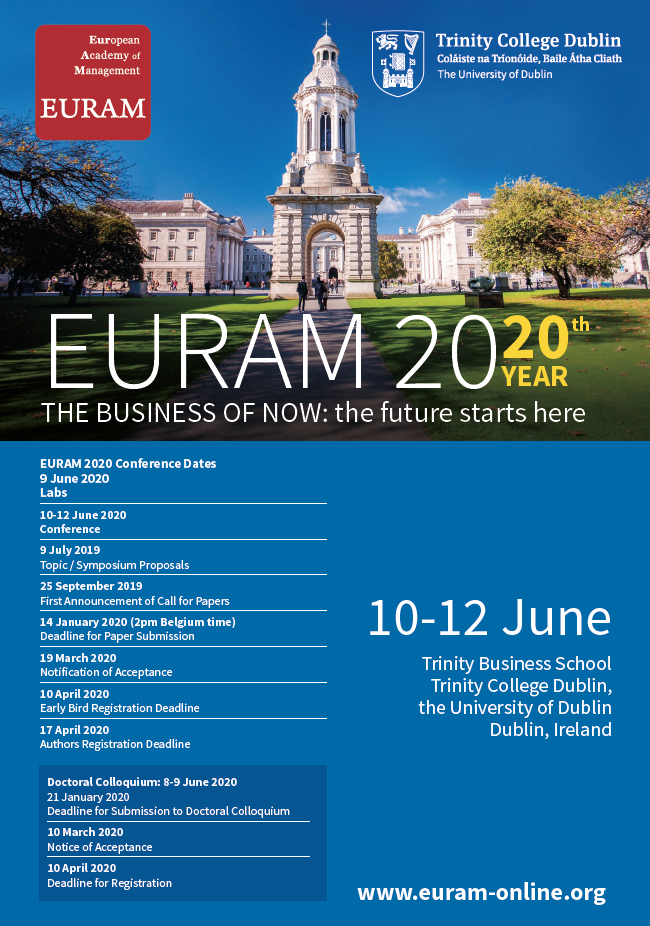The mission of this Special Interest Group (SIG) is to facilitate and promote the development and exchange of knowledge within all areas of International Management within and beyond the academic community. In line with the European Academy of Management’s (EURAM) mission this SIG aims to be an open, international and multicultural European forum for networking and research (theoretical, empirical and methodological ) related to International Management with a particular (but not exclusive) regional focus on Europe regarding (a) the SIG community and (b) the geographical scope of empirical or conceptual research.
SIG OFFICERS (2019-2021):
Markus G Kittler (MCI Management Center Innsbruck) This email address is being protected from spambots. You need JavaScript enabled to view it. SIG chair
Yvonne McNulty (Singapore University of Social Sciences) This email address is being protected from spambots. You need JavaScript enabled to view it. SIG PROGRAMME chair
GT07_00 International Management General Track
The general track of our SIG is interested in research addressing the challenges organisations face in an increasingly internationalised environment. We invite research on ALL subfields of International Management and International Business and we encourage multi-disciplinary studies fostering cross-pollination with other fields. We are open to conceptual work and empirical studies advancing existing research as well as fresh perspectives on IM. For the 2020 conference, we explicitly invite research linking our SIG's scope on internationalisation with SMEs, competitiveness and recent challenges including regional disruptions, digitalisation and AI. Another focus will be on practitioner-led scholarship and experimentation with an international outlook.
UN Sustainable Development Goals (SDG):
Goal 4: Quality education,
Goal 7: Affordable and clean energy,
Goal 8: Decent work and economic growth,
Goal 9: Industry, Innovation, and Infrastructure,
Goal 11: Sustainable cities and communities,
Goal 12: Responsible consumption and production
Markus Kittler , MCI Management Center Innsbruck, This email address is being protected from spambots. You need JavaScript enabled to view it.
INTERNATIONAL MANAGEMENT SIG STANDING TRACKS
ST07_01 Expatriate Management
The topic of Expatriate Management (EM) typically involves international mobility for work purposes by skilled workers and professionals, the core of which are assigned and self-initiated expatriates as well as ‘alternatives’ such as commuters, international business travelers and short-term assignees. Being concerned with all the aspects of global mobility that impacts the study of business and management, especially pertinent to EM are under-researched areas that look at mid- and low-status workers, expatriate entrepreneurs, and issues of duty of care, global talent management and families. Emerald Publishing and Journal of Global Mobility have instituted an annual Best Paper Award for EM at EURAM Conferences.
UN Sustainable Development Goals (SDG):
Goal 16: Peace, justice and strong institutions
Jan Selmer , Aarhus University, This email address is being protected from spambots. You need JavaScript enabled to view it.
ST07_02/ST08_01 - Managing Sport Events and Participation (co-sponsored by International Management SIG-07 and Managing Sport SIG-08)
Goal 4: Quality education,
Goal 5: Gender equality,
Goal 6: Clean water and sanitation,
Goal 7: Affordable and clean energy,
Goal 8: Decent work and economic growth,
Goal 9: Industry, Innovation, and Infrastructure,
Goal 10: Reducing inequalities,
Goal 11: Sustainable cities and communities,
Goal 12: Responsible consumption and production,
Goal 13: Climate action,
Goal 16: Peace, justice and strong institutions
INTERNATIONAL MANAGEMENT SIG TRACKS
T07_03 - Culturally sensitive research in organizations
This standing track is dedicated to exploring the complex role of cultures in organizations with qualitative methods. It welcomes papers dealing with cross-cultural encounters in work settings, international transfer and recontextualization of management tools, languages and cultures in organizations, the interplay of cultures and power relations in diverse organizations, etc. It also addresses methodological questions: How to get access to international settings? How to compare equivalent situations across countries? What language should be used? How to deal with translation issues? What strategies allow academics to produce meaningful intercultural research?
UN Sustainable Development Goals (SDG):
Goal 8: Decent work and economic growth,
Goal 17: Partnerships for the goals
Sylvie CHEVRIER , Université Paris-Est, This email address is being protected from spambots. You need JavaScript enabled to view it.
T07_04 - Emerging Markets Studies
Business and management in emerging markets has become more important than ever before. Digitalisation and innovative disruptions are changing economic activities globally, where organisations in and from emerging markets are increasingly taking leading roles. We call for management solutions to and theorisation on (1) understanding the business environment; (2) preparing for market entry; (3) engaging in market development and expansion; (4) tackling cross-cultural issues; and (5) managing people in emerging markets. Papers are welcome from these perspectives: Management in emerging markets; Institutions in/from emerging markets; and marketing, consumption, and sustainability in emerging markets.
UN Sustainable Development Goals (SDG):
Goal 1: No poverty,
Goal 8: Decent work and economic growth,
Goal 9: Industry, Innovation, and Infrastructure,
Goal 11: Sustainable cities and communities,
Goal 12: Responsible consumption and production
Lisa Siebers , The University of Stirling, This email address is being protected from spambots. You need JavaScript enabled to view it.
T07_05 - International Competitiveness
The International Competitiveness track invites submissions of empirical and conceptual papers exploring competitiveness in an international context.
Scholars are invited to reflect on the determinants of competitiveness from bottom-up (micro or firm-level and mezzo or cluster-level) and top-down (mezzo or regional level and macro or national/international level) perspectives.
Gaps at the intersection of management and economics literature around competitiveness lend themselves to conceptually relevant research, with high practical impact. International competitiveness shapes both developing and developed nations, addressing challenges of strategy, firm growth and performance, sustainability, economic and social development and policy making.
UN Sustainable Development Goals (SDG):
Goal 1: No poverty,
Goal 8: Decent work and economic growth,
Goal 9: Industry, Innovation, and Infrastructure,
Goal 10: Reducing inequalities,
Goal 11: Sustainable cities and communities,
Goal 12: Responsible consumption and production
Pablo Collazzo , Vienna University of Applied Sciences – FH Wien, This email address is being protected from spambots. You need JavaScript enabled to view it.







